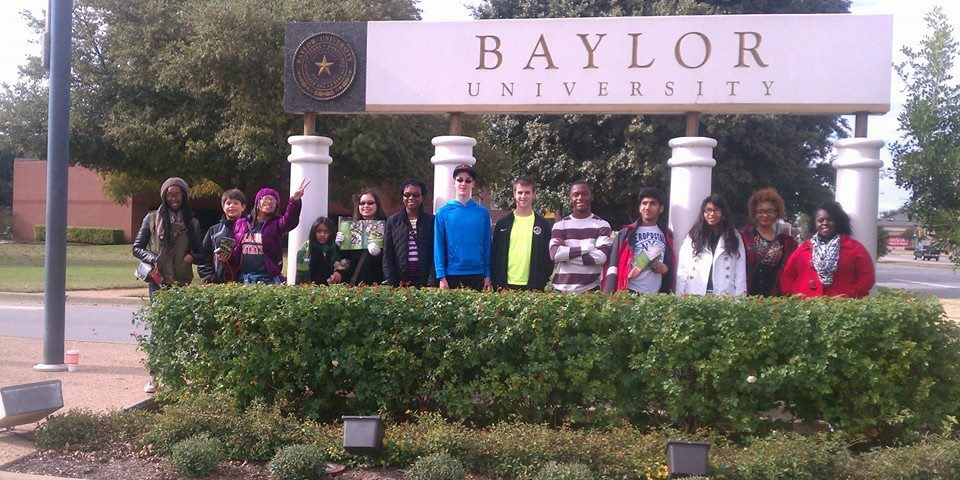
A college trip to Baylor University.
Johnnie Jones III was saddened back in the early ‘90s by how young baseball players with athletic ability in his neighborhood on the South Side of Chicago were lost once they aged out of the local league.
“They were excellent athletes, but they couldn’t read. As soon as they got to the age where they were too old to play in the league, most of them wouldn’t even graduate from high school and the ones that did just kind of found jobs. College wasn’t even an option because of their grades,” said Jones.
When he saw that these students couldn’t see what was possible for their lives beyond high school it inspired him in 1992 to start the Make A Difference Youth Foundation. Jones, who has a Bachelor of Science in Computer Information Systems from Roosevelt University, believed that if kids could see other young people who looked like them on college campuses, they could see a future for themselves.
“I was not enjoying seeing kids that were being cheered for their athletic abilities and then all of a sudden sitting on park benches and maybe going to a gang or selling drugs or something because there was nothing else for them to do,” said Jones.
In “Chi-Town: Enabling Greatness,” which Jones self-published in December 2016 he tells the story of the Foundation which aimed to work with kids from elementary school through high school so that they would be prepared for college and have a good idea of what they wanted to study. As part of his foundation, he created an after-school group called Teens for a New Tomorrow (TFANT) to give teenage kids a place to go. In the early days, Jones met with 20 high school students on in the locker room at Gately Stadium, a small football stadium where many Chicago public schools played their games as most high schools didn’t have a stadium. That number grew to 50 and during football season they were forced to meet in the parking lot.
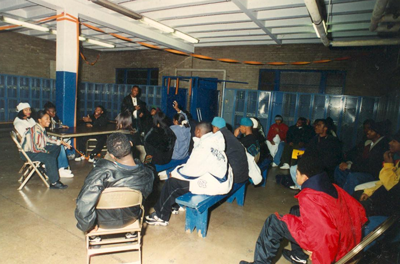
Jones meeting in the locker room at Gately Stadium.
Initially, they focused on developing the student’s leadership skills. The kids held official roles as they learned how to organize, plan, and facilitate the meetings. Eventually, Jones found an office. It had a big hole in the middle of the floor where you could actually see the basement below, but it was a place to meet. He has faced obstacles every step but says God always found a way to get him through the tough times.
The first big project he worked on with the kids was hosting a citywide mock election. Local tech company ANET Internet Services donated the website development for the project. It was a huge hit. More than 20,000 high school kids all across the city registered and voted for alderman and the mayor. After the election, the kids were granted an opportunity to visit City Hall and meet Mayor Richard M. Daley who was so impressed by the project that he awarded Jones’ foundation a $25,000 community block grant to continue his work — a gift that was renewed for ten years. With the money, Jones was able to fix up the hole in the office, put in a bathroom, do some necessary remodeling, hire college students as tutors, and pay for the general upkeep of the space.
After he made the fixes the owner sold the building sold. When the new owner came in, he raised the rent three times what Jones had been paying and told him that “kids don’t make money.” The foundation had to go. Around the same time, Jones received a letter from America’s Promise, Colin Powell’s foundation.
Jones was being considered for a large grant but they would need to see his location in two weeks to make sure it met certain physical and electrical standards. It was an unfortunate situation, but God had a plan. Not long after he knew he would be forced to move his foundation, Jones happened to be in a pizza place in a mall next door to his office when he saw a “For Rent” sign posted. He went in and talked to the owner about his foundation. She was a retired teacher who owned a daycare and welcomed renting to an educational group.
Jones was upfront about his financial situation.
“I said, this is the money I have that comes in from the city, and this is all I can afford. She said, ‘That’s fine.’ So just out of the blue from me getting some pizza, the place next door just happened to be up for rent. That’s how blessings come,” said Jones.
And the blessings continued. The office had been a former hair salon and had twenty sinks on the wall he had to remove. Jones had no idea how he would do it in time for the visit from Colin Powell’s foundation, but more blessings came.
One of the parents came by to check out the new facility, saw the sinks, and removed them that same night for free. He was a professional plumber, single dad, and grateful for how the organization helped his daughter.
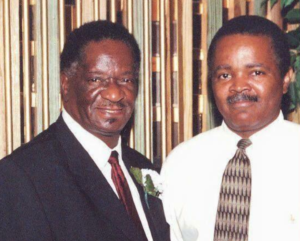
Jones (right) and the former Illinois Senate President Emil Jones III (left).
“As a single dad, having a place to know my daughter was safe every day, that meant the world to me. So, getting an opportunity to do something back for you guys, not a problem at all,” Jones recalls that parent saying.
Then, a neighbor helped him do the needed drywall and painting, all with an agreement that he could pay in the future. Next, an electrician who Jones had helped get a computer when he was first starting out, offered to do all the wiring for free.
In two weeks, everything was done and in 2000 the Make A Difference Foundation was one of the ten organizations from around the nation, and the only organization from the Midwest selected to receive a new computer lab by means of Colin Powell’s “PowerUP” initiative. Hewlett Packard, AOL, Gateway and Cisco Systems were sponsors of PowerUP and provided each PowerUP site with computers, free AOL accounts for the kids in the program and Cisco networking equipment. The next year, they got a special award and an extra $35,000 for being the National PowerUp Site of the Year.
“He had a vision. He always thinks outside the box, and he would come up with things that no other organization would come up with that he felt the kids could do. And he was always challenging them, exposing them to experiences that they would not otherwise have had,” said Elaine Jones (no family relation), an active and dedicated volunteer whose daughter participated in the program.
By 2007, Jones’ group had expanded its mission to include community service projects and college campus visits. The students were required to do forty hours of community service, but they often logged more than 200. He had established relationships with college admissions recruiters, and some would even send a complimentary bus to pick up the kids in his program to visit their schools. The foundation had received many more grants and was able to support a summer camp for elementary schoolers and field trips. With two locations in Chicago and a staff, the bills mounted up to $25,000 a month with rent and electricity.
More than 5,000 students have gone through the Make a Difference Foundation programs since its inception back in 1992. Many of the students went on to attend colleges such as Princeton, Drake, and Duke, and credit his program for who they are today. Courtney Barnes is one of those students.
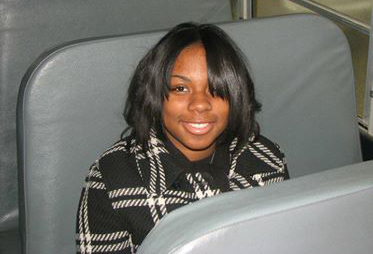
Courtney Barnes on a field trip when she was in high school.
“I think Teens for a New Tomorrow (TFANT) really influenced why I wanted to pursue a career in policy, specifically around racial equity and dismantling systemic racism and doing so by reaching out to our community, specifically our young people and working with them in ways that we can rewrite that narrative of this is what it looks like,” says Barnes, who graduated from the University of Illinois at Chicago with a bachelor’s degree in political science and government and a master’s in public administration. Barnes is currently Manager of Foundation Relations for Mercy Home for Boys and Girls, a residential care facility for boys and girls who have housing instability.
“I want them to know that there is life beyond the hood. And there’s life beyond that narrative of whatever they’re writing for our young black boys and girls. TFANT was that for me. I want to be that person for those young people.”
But when the markets crashed in 2008 funding for the foundation was hit hard. With the economic downturn, all of the grants dried up. Jones tried to keep the offices open with his own funds, but it wasn’t enough because the organization had grown so big. Plus, Morgan Stanley, the company where Jones worked, had layoffs, and he was out of work. He had to close up both of his offices and donate the supplies and equipment to another nonprofit. It was heartbreaking.
“I got two letters from kids when we shut down, begging us not to shut down the organization down, I never got over those letters. One said, ‘This is the only safe place I have to go to.’ When you’re reading those things, you kind of look and go, ‘I wish there was something I could have done,’ but I wasn’t in that position,” said Jones. “I’ve never been so crushed in my life than I was the day I had to lock all those offices and turn in the keys and then just say, ‘that’s it.’ So my success in technology, a lot of it was driven on, ‘I’ve got to make enough money so I can do this again and not let it fail.'”
The organization was able to hang on for a few more years. Jones did some consulting work in North Carolina and South Carolina
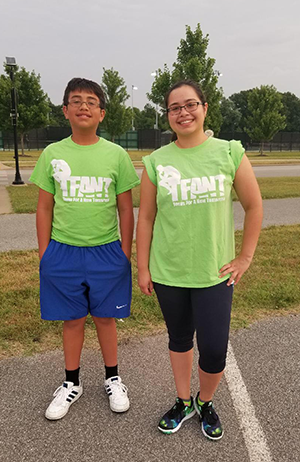
Karime Bolivar on the right is now in med school. This was Karime and her little brother at a community service project in Arkansas while she was in high school.
before eventually taking an IT position in Arkansas at Walmart. But he still tried to remain involved with the kids. Elaine was now at the helm, able to keep the service projects end of the organization going for a while. They worked together, had a core group of students still involved, and schools would send over other students to take on college trips or do community service projects.
“We even rented SMU campus buildings for a weekend and flew Native American students from a reservation in Michigan to hold a student-led conference with students from Chicago and Dallas. That was the biggest time that God stepped in! Elaine was our lead chaperone and got left by the plane at O’Hare airport, trying to help a late student make the flight. The plane was headed to the runway for takeoff and a chaperone called me from the plane to let me know the plane left Elaine. A flight attendant overheard the call and told the pilot. The pilot turned the plane around! A United Airlines flight was turned around, and they picked up Elaine. God has been good!” said Jones.
In 2013, Elaine could no longer manage the organization and it stopped operating in Chicago. But that wasn’t the end for the Foundation. In 2014, Jones brought it back to life in Arkansas. This time, with a new strategy. Instead of depending on outside funding, he has chosen to finance it himself. Even as it limits how many people he can help, but he can keep the organization running without fear of being shuttered.
“It’s knowing that this is something that is not me — it’s God. We couldn’t fail because God had a way for it. We should never have been in People Magazine. We should never have met Colin Powell. We should never have gotten a grant from the mayor. Everything that was happening was steps that were placed for us to succeed. And when we had to shut down in Chicago, it still wasn’t the end of God’s plan because it started right back up in Arkansas. And the first two graduates we have from Arkansas, one’s in medical school, and the other one’s going to medical school next year,” said Jones.
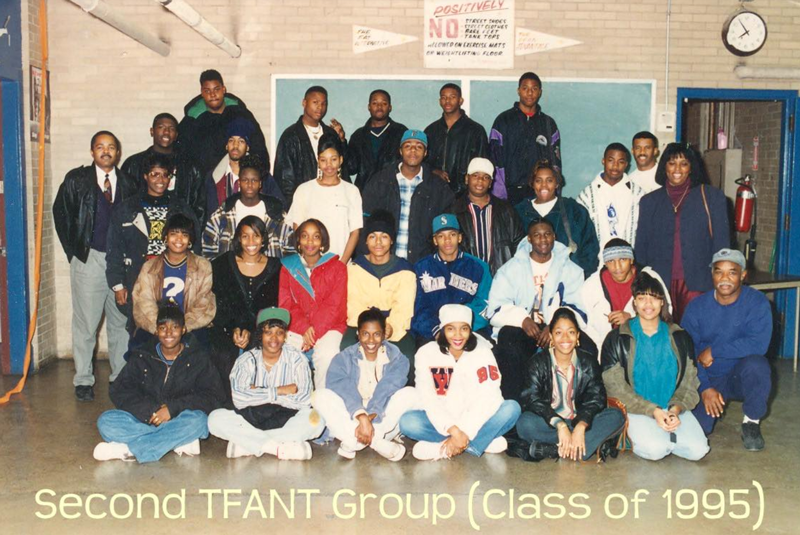

Excellent! MADYF an example to follow. Proud of the organization and the impact in our younger generation.
Thank you!